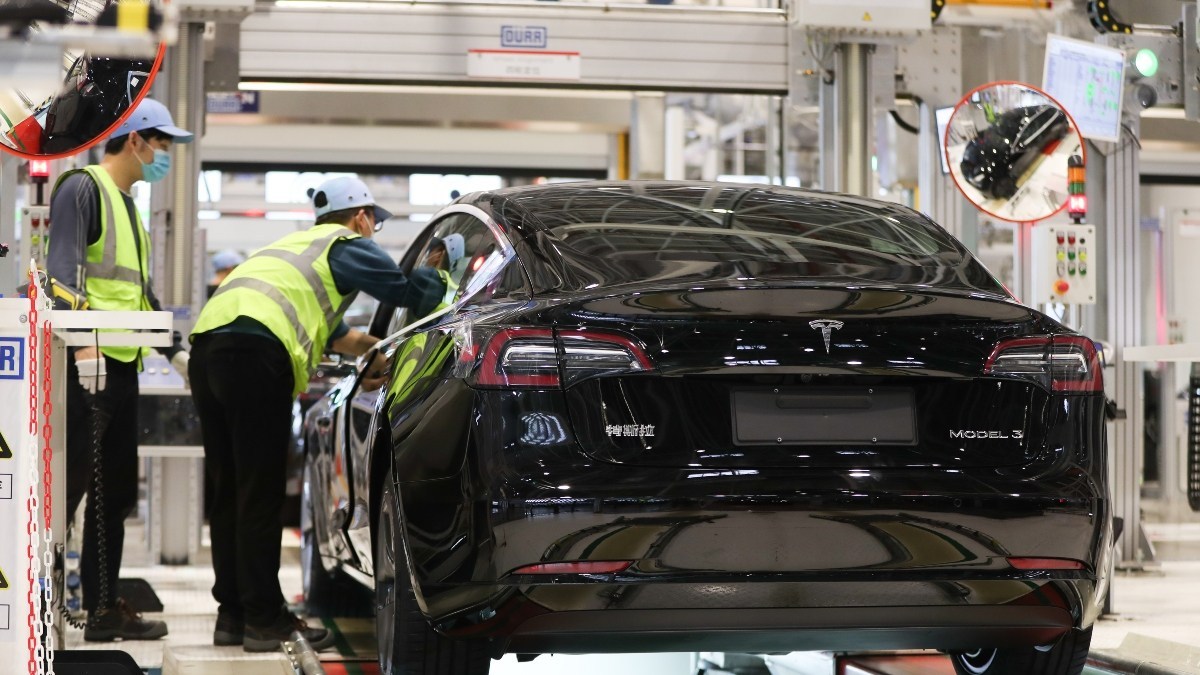[ad_1]
New energy vehicle output will account for 35% of Shanghai’s auto manufacturing industry and reach 350 billion yuan (US$54 billion) by 2025, according to a five-year action plan set by the Shanghai government.
Shanghai will look to expand the annual production capacity of green cars to more than 1.2 million units by 2025 and raise the output value to 350 billion yuan, or more than 35% of the city’s car industry value, Qiu Wenjin, deputy head of the Shanghai Municipal Development and Reform Commission said on Thursday. Qui spoke while releasing the new energy vehicle industry development plan for the 14th Five-Year Plan period (2021-25).
“Apart from expanding the scale of industry, we should make breakthroughs in core technologies, acquire leadership in research and development of key components and manufacturing, make breakthroughs in connected vehicles and intelligent technologies, and establish a complete supply chain,†Qiu said.
The action plan specifies 19 key tasks in five key areas, including industrial capability enhancement, creation of an ecosystem, establishment of a green transportation energy system, development of “new infrastructure†facilities and integration of related systems and mechanisms.
In 2019, Tesla Inc built its first Gigafactory outside the United States in the new Lingang area, Shanghai with a designed annual production capacity of 500,000 units. The company planned to start mass production of made-in-China Model Y vehicles in the first half of 2021.
Tax cuts on imported goods
China’s overall tax rate on imported goods was slashed by more than a quarter during the 13th Five-Year Plan period (2016-2020), hitting an all-time low, the General Administration of Customs (GAC) of China said Thursday. The tax rate refers to tariffs and value-added taxes on imported goods.
The overall tax rate on imported goods had dropped from 21.8% to 15.8% over the past five years, said Jiang Feng, an official with the GAC, adding that the decline was due to China significantly reducing its value-added tax (VAT) and tariffs during the period.Â
However, the total amount of customs duties and taxes, mainly VAT and consumption tax, on imported goods grew 8.7% to 8.99 trillion yuan in the last five years, he said. The increase showed that China has substantially expanded imports through tax cuts during the 13th Five-Year Plan period.
Poverty alleviation
Chinese President Xi Jinping on Thursday presented medals, certificates and plaques to 1,982 personnel and 1,501 collectives as China’s model poverty fighters. More than 500 recipients were enterprises and representatives of enterprises, coming from industries such as the internet, education, agriculture, energy and aviation.
“In the process of participating in poverty alleviation and rural revitalisation, enterprises actually build, upgrade or transform related industries, from which they will profit,†Sun Wenhua, director of the China Agriculture Industry Chamber of Commerce at All-China Federation of Industry and Commerce, told the Global Times on Thursday.
The best-known Chinese private enterprises, including Alibaba Group, Wanda Group, Didi Chuxing and Geely have participated in the mighty task and their work has been recognized.
Company news
Vipshop Holdings, an online discount retailer in China, said it generated total net revenue of 35.8 billion yuan in the fourth quarter of 2020. Net profit rose 67.7% to 2.4 billion yuan for the same period. The company has reported positive net earnings for 33 consecutive quarters.
The company said its active customers grow by 37 % year-on-year to more than 53 million during the quarter while orders surged 30% to 227 million.
Launched in 2008 as Vipshop.com, the company was listed on the New York Stock Exchange in 2012, and a year later launched Vip.com.Â
Video streamer Bilibili Inc announced on Thursday total revenue jumped 91% to 3.84 billion yuan in the three months ended December 31, thanks to the robust growth across its mobile games, value-added services, advertising and e-commerce businesses. Gross profit expanded 137% to 944.1 million yuan.
Average monthly active users, a common indicator of customer loyalty, increased 55% to 202.0 million, said the company.
The stories were compiled by Nadeem Xu and KoKo and first published at ATimesCN.com.
[ad_2]
Source link














